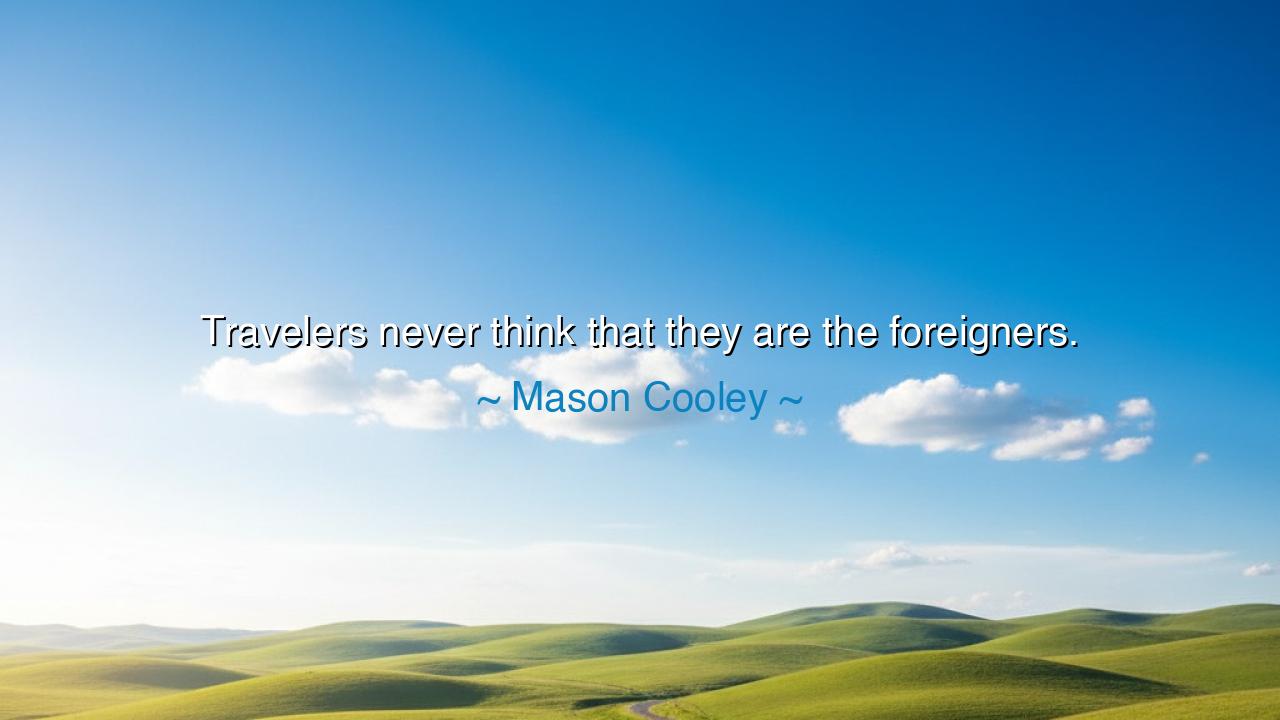
Travelers never think that they are the foreigners.






Hear the sharp and enduring words of Mason Cooley: “Travelers never think that they are the foreigners.” This brief saying, like a sword, cuts to the heart of human pride. For it is easy for the traveler to imagine himself the center, the measure of the world, moving like a master across strange lands. Yet he forgets that in every place he visits, he is the outsider, the stranger, the one who does not belong. To those he passes, it is his face, his tongue, his manner that marks him as foreign. Cooley reminds us that humility is the first step of true travel.
The error lies in the arrogance of the wandering soul. Many who travel see the new land as a stage set for their experience, its people as extras in the drama of their journey. They forget that those they observe are not mere characters but the rightful inhabitants, while they themselves are the oddity, the visitor, the intruder. To deny this is to fall into blindness. But to acknowledge oneself as foreigner is to awaken the spirit, to open the heart to genuine exchange.
History teaches us this lesson again and again. Consider the Spanish in the New World, who arrived believing themselves bearers of light and civilization. To their eyes, it was the native peoples who were “other,” strange, alien. Yet to the eyes of the Aztecs and Incas, it was the armored Spaniards who were grotesque, their language harsh, their customs bizarre. Each believed the other to be foreign, but the true blindness lay in the conquerors who never paused to see themselves as such.
Or recall the great merchant Marco Polo, who journeyed from Venice to the court of Kublai Khan. He described with wonder the lands of China, marveling at their wealth and customs. Yet it was Polo, with his European clothes and Christian ways, who was the foreigner in those courts. His survival and success came not from denying it, but from embracing it, from learning the language, observing the etiquette, respecting the grandeur of another civilization. His openness made him not only a guest, but a bridge between worlds.
So too in our age, when tourists flood cities, they often complain of the “strange” ways of locals, of customs that inconvenience them, of foods that unsettle their stomachs. They forget that it is not the locals who are out of place—it is they. Such forgetfulness breeds disrespect, mockery, and cultural arrogance. But the wise traveler knows: “I am the stranger here. Let me listen first. Let me learn. Let me walk softly upon another’s soil.”
The lesson, then, is clear. True travel is not conquest, not mere consumption of sights, but humility. To be a traveler is to accept the role of foreigner, to learn the customs, to respect the rhythms of others’ lives. Only then does the journey become more than spectacle—it becomes transformation. For when you acknowledge yourself as the foreigner, you begin to see others not as strange, but as hosts, teachers, and guides.
Practically, this means: when you walk in another land, observe before you speak. Learn at least one word of the language, not to master but to honor. Respect the customs, even if they seem strange, for they are the lifeblood of that place. Remember that your presence is a privilege, not a right, and your conduct either opens or closes the door between peoples. To carry yourself with humility is to leave behind not offense, but gratitude.
Therefore, O seekers of wisdom, let Cooley’s words guide you. Do not wander the earth with the blindness of pride, thinking always that the other is foreign while you remain central. Know this truth instead: wherever you go, it is you who are the foreigner. Accept it with humility, and the world will open its treasures to you—not as a stage to be consumed, but as a home in which you are but a guest. And in honoring this truth, you will find that every journey deepens not only your knowledge of others, but your knowledge of yourself.






AAdministratorAdministrator
Welcome, honored guests. Please leave a comment, we will respond soon